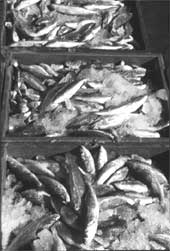Done to death
 overfishing in the past is largely responsible for the recent collapse of coastal ecosystems around North America and Australia, is the conclusion reached by a team of 18 scientists that has sifted through large volumes of geological, archaeological, historical and ecological data.
overfishing in the past is largely responsible for the recent collapse of coastal ecosystems around North America and Australia, is the conclusion reached by a team of 18 scientists that has sifted through large volumes of geological, archaeological, historical and ecological data.
Global climate change, pollution and the invasion of non-native species into new habitats have all been blamed for marine ecosystem problems in recent decades. But overfishing appears to be the biggest factor (www.news. uchicago.edu , September 3, 2001).
Accoridng to Susan Kidwell, professor of geophysical sciences at the University of Chicago, usa , "The depletion or near-complete removal of top predators and of habitat-modifying organisms like oysters by human fishing is the fundamental culprit, and this has been going on for centuries in some areas. A lot of the deterioration that we see today is the final outcome of a collapse that has been occurring over much longer periods of time.'
The team led by Jeremy Jackson, professor at the Scripps Institution of Oceanography, usa, and other ecologists have noted that the ecosystems they have been studying in recent decades have been so significantly altered by human impact that the environments no longer could be viewed as natural. So Jackson put together a team of scientists that included geologists, paleontologists and archaeologists as well as marine ecologists in order to assess more precisely the condition of selected marine environments for thousands of years. Specifically, the team searched for key biological information on the changing population and body sizes of fish, marine mammals, seagrasses, kelp forests and reefs. The team also compiled information on other marine health indicators such as the incidence of marine diseases, invasive species, low-oxygen situations (red tides), and the relative productivities of microbes versus animals on the sea floor and in the water.
The timing of changes in these conditions were then compared to the regional history of human impacts, such as fishing of fin and shellfish, sediment and nutrient run-off from land clearance and agriculture, and pollution levels from industry and other urbanisation.
The data revealed a pattern of progressive
Related Content
- Judgment of the National Green Tribunal regarding concretization of open spaces and green belts in Punjab, 30/01/2024
- Preliminary report of the Amicus Curiae on baolis/stepwells in Indore, Madhya Pradesh, 28/08/2023
- Order of the National Green Tribunal on the matter of a fire at a dumpsite in Ludhiana, Punjab, 25/07/2022
- Losing time: end this pandemic and secure the future
- Order of the High Court of Uttarakhand on the state's preparedness to control Covid-19 and holding of Charm Dham Yatra, 23/06/2021
- Report on waste dumping in village Ganwri on the banks of Kali river, Meerut, Uttar Pradesh, 27/08/2020
